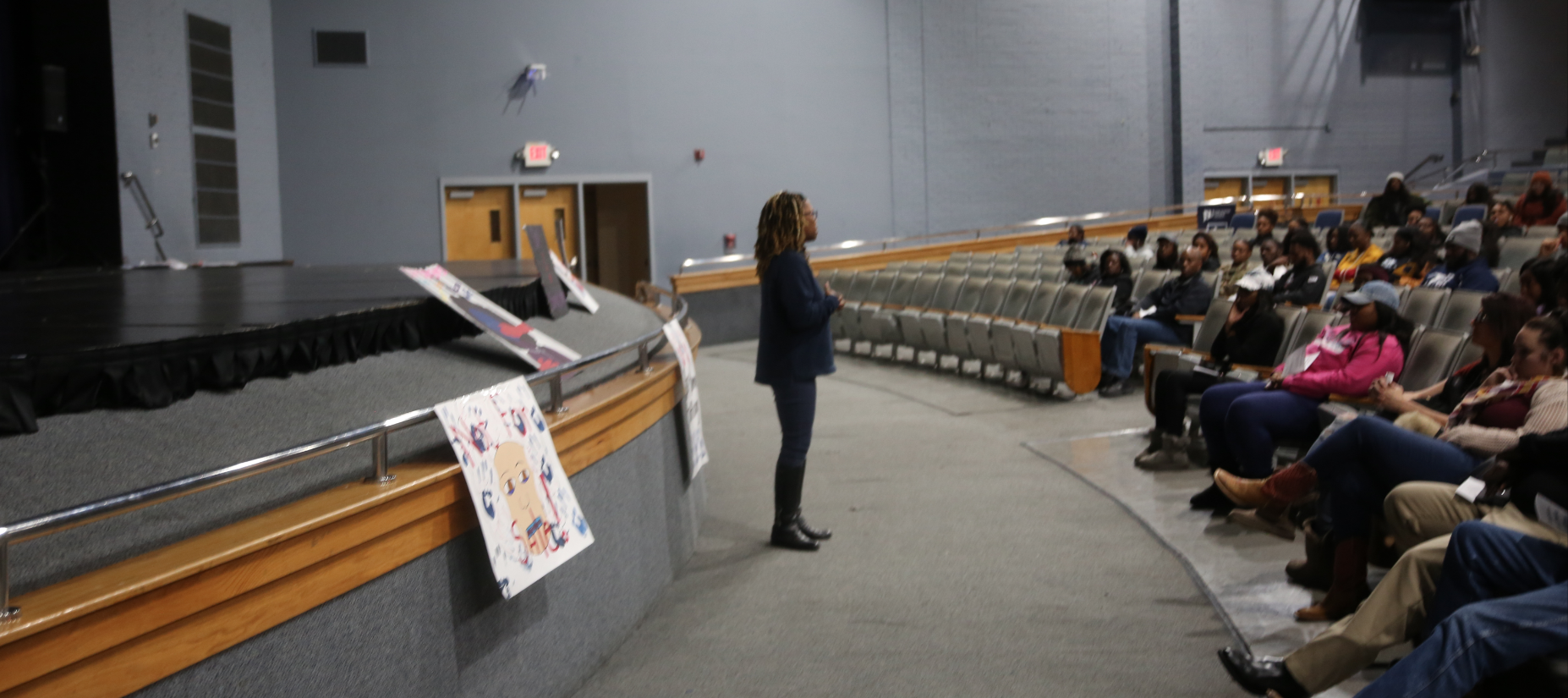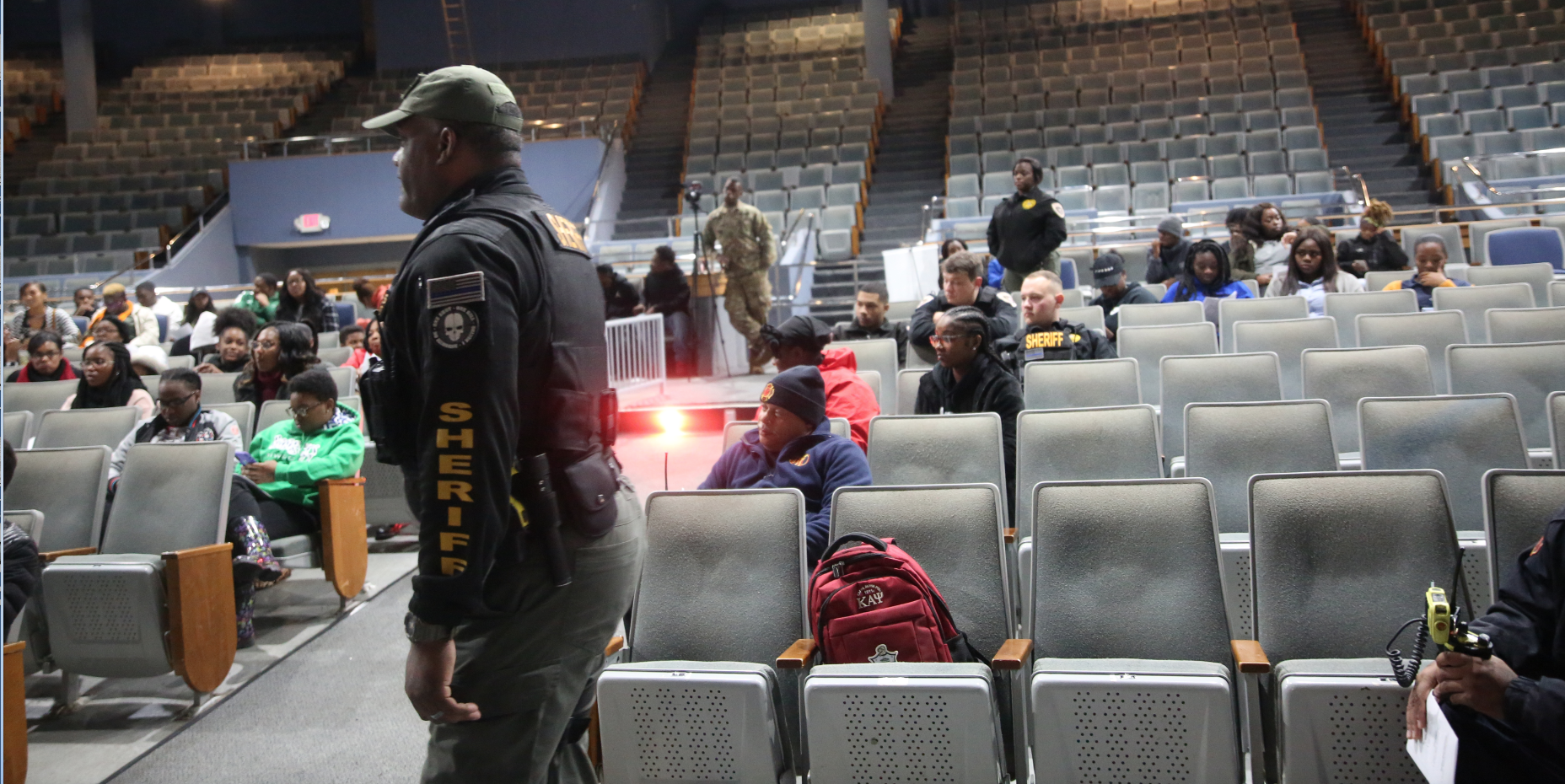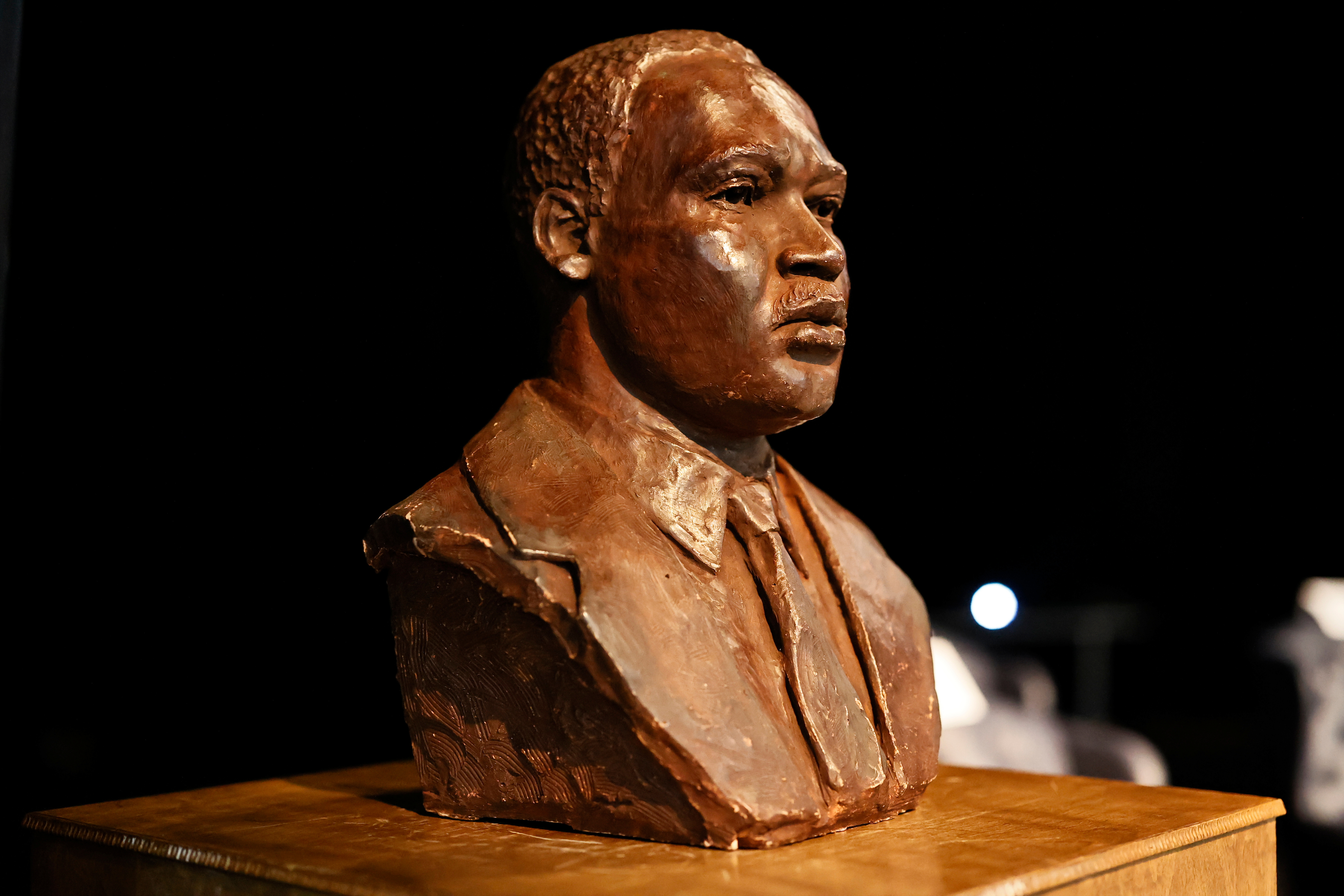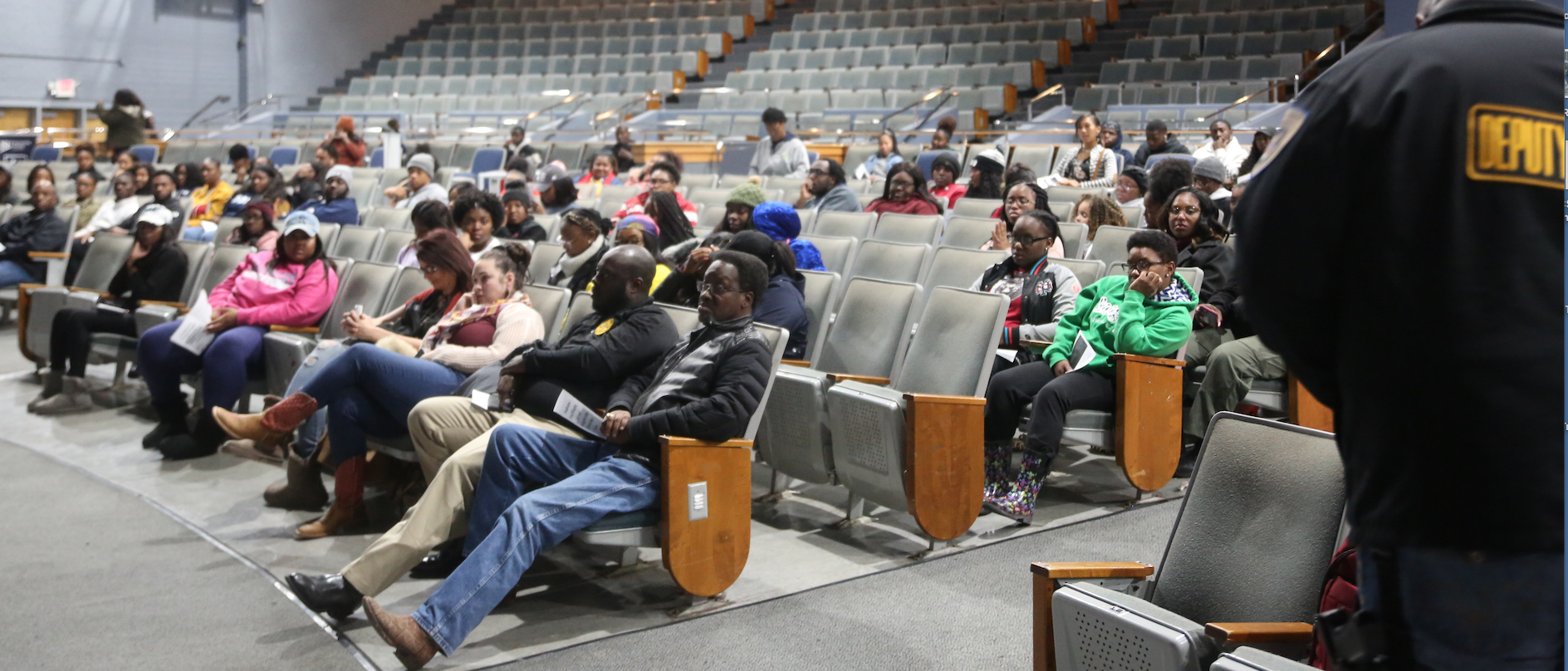
![]()
[hr]Jackson State University’s Department of Public Safety and the Hinds County Sheriff Department teamed up recently to urge JSU students to take precautions amid rising dangers of human trafficking throughout the city and state – and especially on college campuses.
Helen Brown is the human trafficking coordinator in the Investigation Division of the Hinds County Sheriff Department. She’s also part of a statewide task force, dealing mostly with sex trafficking. She spends a lot of time helping victims caught up in the crime and tries to keep them from being locked up repeatedly.
In one astonishing development, she said drug dealers seeking more money are now turning their attention to human trafficking.
Officials, however, are tackling the crime surge, and Brown credits Sheriff Victor Mason for launching the first human-trafficking division by a law enforcement agency in Mississippi. He attended the forum along with numerous deputies.
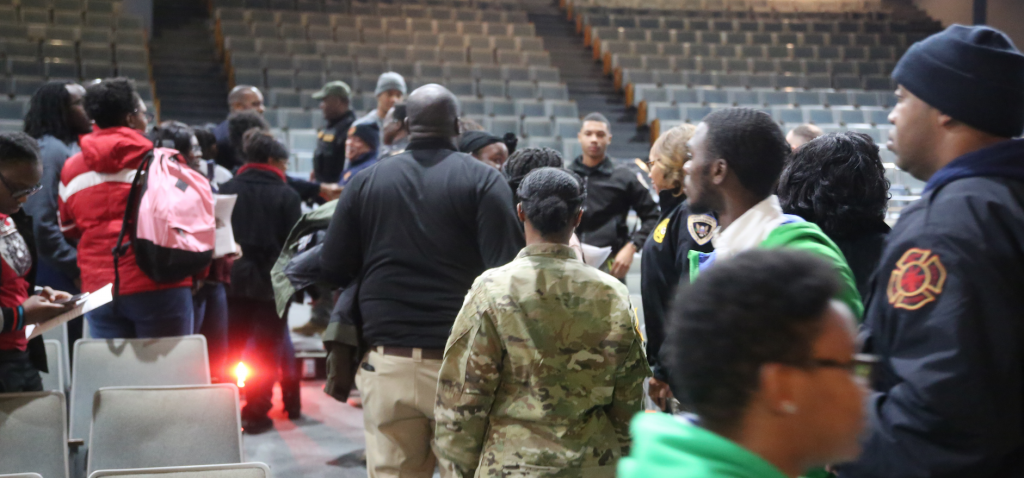
[dropcap]W[/dropcap]HILE JSU is a relatively safe campus, Brown recently told an audience of nearly 100 students inside the Rose E. McCoy Auditorium that danger lurks anywhere. She recalls when a student on the HBCU campus was held and questioned about suspicious activity.
Brown said there’s a misconception about pimps. “People think they are older men and women. Instead, they are likely the same age as student victims. You have to be careful who you call your friends because nine times out of 10 they’re recruiting you.”
She urged students to be careful and said while most of them are walking to classes some of their peers are circling campuses throughout Mississippi and recruiting and making money off them. “You have to be mindful and careful about who you accept a ride from. A lot of times things happen to you, and you refuse to tell. Keeping it a secret does not help. It hurts you and others.”
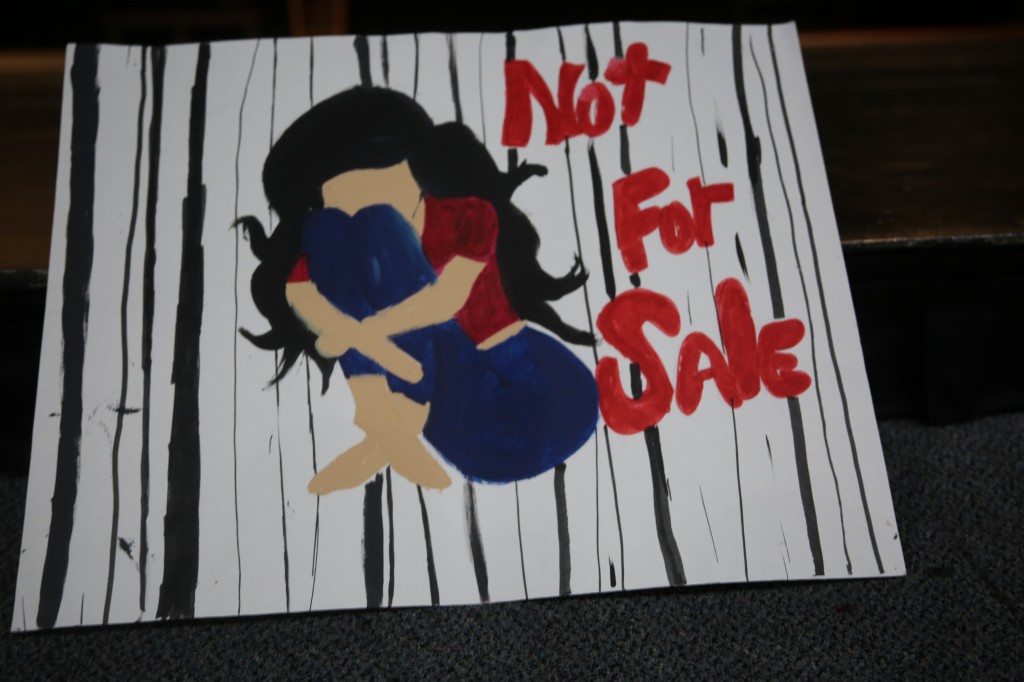 Sgt. Portia Moore of the JSU Department of Public Safety said, “We, as a department, community and university, will make sure everyone is informed about this issue. As for any safety concerns, we’re going to do better by being out there and more visible for the entire campus community, and especially our students.”
Sgt. Portia Moore of the JSU Department of Public Safety said, “We, as a department, community and university, will make sure everyone is informed about this issue. As for any safety concerns, we’re going to do better by being out there and more visible for the entire campus community, and especially our students.”
Furthermore, she said, “This is the first session on human trafficking, but it definitely won’t be the last. This is information they all need to know.”
LeKesha Varnell is the Title XI coordinator at JSU. Her job is to “help ensure your safety and make sure the university complies with federal law in the event something happens to you. If you are sexually assaulted, and that includes human trafficking, we have to make certain accommodations for you throughout your matriculation at JSU.”
She said that while human trafficking is a billion-dollar industry and won’t be completely eradicated, JSU will continue to focus on protecting students, faculty and staff. “On this campus you can’t have pepper spray, brass knuckles or anything like that, but we do depend on JSU Public Safety to make sure you’re safe. And, we also depend on our students and campus community. If you see something, say something.”
Varnell urged individuals to seek help and take advantage of the various resources.
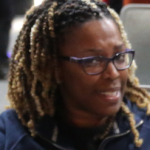
[dropcap]’I[/dropcap]F you or someone you know are victims of sexual assault, human trafficking, dating violence, domestic violence, stalking, cyberstalking, gender harassment, report it to Title XI. We do an on-campus investigation. Title XI makes sure you feel safe and that you are accommodated. We can change housing arrangements. If you are failing classes because of being traumatized, we can seek options to get you tutoring or make-up classes. If you’re in class with the respondent – the person who allegedly assaulted you – we want to make sure we eradicate that immediately.”
To the men in the audience, she said, “Our male students have a mindset that if someone reports and accuse them of rape then it’s over with for them. That is not how Title IX works. It investigates thoroughly and equitably. We ensure the rights of both the respondent and the complainant throughout the investigation.”
Meanwhile, to show that anyone – regardless of color – can fall into the trap of human trafficking, a young white adult victim appeared with the Hinds County law enforcement to share her story with the mostly African American female audience.
Nikki, not her real name, said she was in the streets using drugs. Her life spiral downward in 2008 while walking on Mill Street. There, she accepted a ride in a car from “a charming, well-dressed man with Texas license plates who said he was a pimp.” Eventually, he took her cell phone and ID and threw them out the window. He promised her $3,000 a day. During the next couple weeks, she was beaten.
 She learned that her photo had been posted online by the pimp to earn more business. After she learned the tricks of the trade, she began pimping herself while also becoming romantically involved with her perpetrator. Over 10 years, she went from relationship to relationship, failing each time to fight her way out of her dilemma.
She learned that her photo had been posted online by the pimp to earn more business. After she learned the tricks of the trade, she began pimping herself while also becoming romantically involved with her perpetrator. Over 10 years, she went from relationship to relationship, failing each time to fight her way out of her dilemma.
Sadly, her family never reported her missing because “I was a drug addict.” Nikki also said she was too embarrassed and “didn’t want anyone to know what had happened to me.”
[dropcap]A[/dropcap]FTER doing some research, she would eventually seek counseling and “began a relationship with God.” She’s been sober for almost two years now.
To students using dating websites, Nikki urged them to be careful because “many people are not who they say they are. They offer you jobs, auditions and appearances in rap videos. It’s usually someone trying to sell you. They usually will take you to another state and get you out of your comfort zone so you feel you have only them to rely on.”
She also advised parents: “Watch your children’s friends, and watch their phones.”
Nikki’s testimony and warnings from law enforcement gripped students in the audience.
Charlotte Sanders is a Jackson native and junior studying criminal justice at JSU. She attended the forum because “there’s a lot of human trafficking going on around us, and we need to protect ourselves by learning how to prevent this from happening.” She said if a pimp or recruiter approach her she would ignore the person and walk away.
“If they forcibly try to grab me I would scream and run to try to draw attention,” said Sanders, who avoided being kidnapped in the 10th grade. “I now know to be more focused, stay off the phone and be more conscious about what’s going on around me.” Some people walk alone at nighttime. I walk at night because I get off work late, but I have people on standby. A lot of my friends have my location and know where I am in case something happens.” Since she can’t have mace or lethal weapons on campus, she agrees that a whistle – and perhaps a bell – might help repel a potential ambush or assault.
[dropcap]O[/dropcap]NE of the few male students in the audience was Kobe Vaughn, a native of Mobile, Alabama. The business and marketing major had accompanied a friend, but the powerful forum grabbed his attention. He said more work needs to be done to tackle sex trafficking.
“Security on campus can do a better job of keeping people off campus who shouldn’t be on campus. Human trafficking is sad because I actually know people who have gone missing, especially in Alabama.” He said a little girl in his neighborhood was recently kidnapped and hasn’t been found.
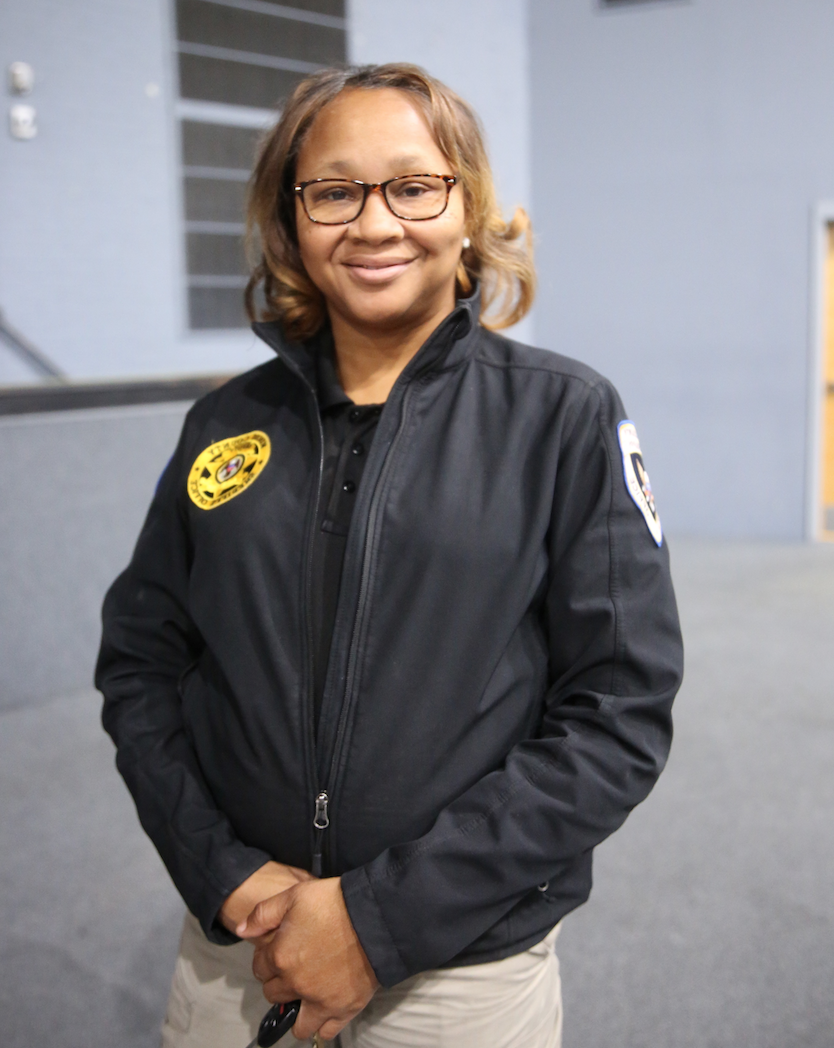
“I also take precautions. I used to walk the plaza at night, but I realize I have to keep my senses aware. I always have my headphones. Nowadays, though, I keep one out of my ear. I see a lot of people walking around on campus at night, and you really don’t know if they attend school or not. You really have to watch your back because sometimes you think that just because you’re on campus you’re safe. Really, you may not be.”
Vaughn said his regret was that more people didn’t show up for the forum. “There’s a lot going on and some people are really not taking it serious. For people to go missing like that, it’s sad. That’s someone’s child. My advice is to avoid walking by yourself at night, especially if you’re a female.”
Alongside that warning, Brown of the Hinds County Sheriff Department has another reminder: Avoid attending raucous “kickbacks” in hotels. “Be mindful about attending those because people have started putting drugs in your drinks, and they’re selling you while you’re knocked out. You can’t do anything about, but you know something happened to you. You just don’t know what happened.”
[dropcap]A[/dropcap]S well, Brown said a lot of people in neighborhoods are taking part in the crime because it’s a money-making industry. “Rather than selling drugs, dealers are now selling your children. They target college campuses because a lot of these students don’t have money and are looking to make extra cash. “You are all a hot commodity now.”
She noted that sex recruiters often approach students by claiming to be looking for potential models while also promising fast cash overnight.
In fact, she said, “They may want them to work in massage parlors or nail shops, among other things. So, students need to be careful because once they learn the game pimps are not going to allow you to leave. Remember, you don’t have any friends here. Come here to get your education and go home.”
Brown continued painting a stark picture of the trafficking operation and advised against “all that walking and things you’re doing in the streets and trusting these different guys. Remember, it’s not just guys. It’s women, too. They’re called madams.”
She said a lot of massage parlors have popped up along Highway 80. “No, it’s not a crime to be a masseuse. But, when there’s a happy ending that involves sexual favors at the end of the massage that’s a problem. It’s basically prostitution.”
She debunks arguments from women who say, “This is my body, and I can sell it if I want to.”
[dropcap]S[/dropcap]HE reminds them that it’s a crime to sell your body. Also, she told the JSU audience that three arrests for prostitution is a felony. “And, if you have a friend online getting dates for that purpose they’re going down. When you’re in that hotel room or sitting outside in that car, and when you get done and police show up you’re going to jail, too, for procuring prostitution or promoting prostitution. That’s a felony. And, that’s what they’re prosecuting now, because it’s hard to prove human trafficking, especially for a person older than 18.”
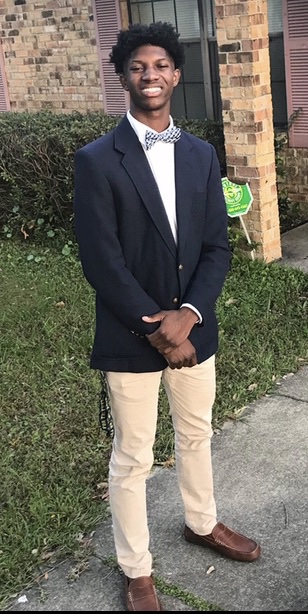
Brown shared a few other salient points about human trafficking in the metro area and beyond:
- “Harvesting organs is a part of human trafficking, and that goes on. “I don’t know of a situation here, but you do have a lot of people who have gone missing and you haven’t heard about them anymore.”
- “Be careful with online dating; you don’t know who you’re going to meet. Some young people are meeting strangers and then you never see the victims again. Regardless to whether you’re on campus if they say they are your friend take that term lightly because a lot of these people are not your friends.”
- “You never know who’s out here making money because anybody can be a recruiter. I’ve seen recruiters as young as 15 years old. They’re getting paid to swindle or persuade you to do something.”
- “It’s hard to get a victim to testify against a pimp or madam.”
- “Checkpoints aren’t necessarily about checking licenses. We’re looking for missing children.”
- “Some hotels are refusing to rent rooms to people inside the city limits because prostitution is so bad.”
- “People are pimping from the jailhouse.”
- “We have people bringing children to the hotel while turning tricks.”
Warning signs that an individual is being trafficked (From the Hinds County Sheriff Department’s Human Trafficking Division)
- Physical abuse such as burn marks, bruises or cuts
- Unexplained absences from class
- Less appropriately dressed than before
- Sexualized behavior
- Overly tired in class
- Withdrawn, depressed, distracted or checked out
- Brags about making or having a lot of money
- Displays expensive clothes, accessories or shoes
- New tattoos (often used by pimps as a way to brand victims. Tattoos of a name, symbol of money or barcodes could indicate trafficking)
- Older boyfriend or new friends with a different lifestyle
- Talks about wild parties or invites other students to attend parties
- Shows signs of gang affiliation (i.e.: a preference for specific colors, notebook doodles of gang symbols, etc.)
Brown said professions and locations don’t matter when it comes to solicitation. What “Johns” (clients) want, pimps will deliver. “We’ve got Johns who are preachers. Just because he’s a preacher doesn’t mean he won’t do it, too.” She also cites a case in which a surgeon was arrested while taking a break between operations so that he could sleep with an underage girl. Another incident involved the arrest of a person from Ridgeland who was attempting to sleep with an underage boy.
Brown said the Sheriff Department has a lot of success stories and delights when victims leave the streets to start new lives. “After their arrests, some people were sent to a safe house for treatment.” Now, some of those individuals have reached out to the Sheriff Department so they can help educate others.
“If you know something say something,” Brown pleaded. “All calls and tips need to go to a hotline (The National Human Trafficking Hotline, 888-373-7888). That information then goes to the task force.”
